

20 Digital Citizenship Resources. Definition Of Digital Citzenship. The Definition Of Digital Citizenship by Terry Heick As more and more students interact digitally–with content, one another, and various communities–the concept of digital citizenship becomes increasingly important.
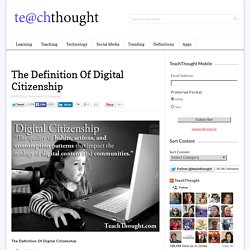
Which begs the question: what is digital citizenship? Well, first citizenship, which is formally defined as “the quality of an individual’s response to membership in a community.” This makes citizenship far more complex than a simple legal matter, but rather one that consists of self-knowledge, interaction, and intimate knowledge of a place, its people, and its cultural history. So digital citizenship is nearly the same thing–“the quality of a response to membership in a digital community” would be a good first crack at the definition. But that leaves out the idea of content itself, which leads us to a pretty good definition for educators: “The quality of habits, actions, and consumption patterns that impact the ecology of digital content and communities.” A Must Have List of Resources on Digital Citizenship for Teachers. Today, I am sharing with you Edutopia's resources on Digital Citizenship.
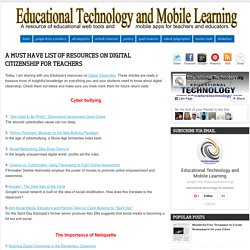
These articles are really a treasure trove of insightful knowledge on everything you and your students need to know about digital citizenship. Check them out below and make sure you book mark them for future return visits : Cyber bullying 1- "She Used to Be Pretty": Schoolyard Harassment Goes OnlineThe wounds cyberbullies cause can run deep.2- Techno Prisoners: Musings on the New Bullying ParadigmIn the age of cyberbullying, a Stone Age tormentee looks back.3- Social-Networking Sites Draw Teens InIn the largely unsupervised digital world, youths set the rules.4- Cinema vs. Cyberbullies: Using Filmmaking to Fight Online HarassmentFilmmaker Debbie Heimowitz employs the power of movies to promote online empowerment and awareness.5-Google+: The Dark Side of the CircleGoogle's social network is built on the idea of social stratification.
The Definition Of Global Learning. Globalization.
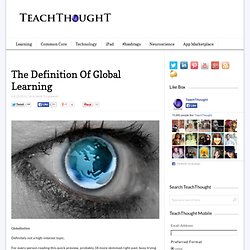
Definitely not a high-interest topic. For every person reading this quick preview, probably 18 more skimmed right past, busy trying to survive right here, right now. This makes sense. Even when it does get attention, it is often bursting with rhetoric and emotion—discussed in tones of enthusiasm (we should do it—the students deserve it!) And grey stereotypes (we Skyped with a classroom in Peru last week—if that’s not global, I don’t know what is). In high-stakes testing environments prevalent in many formal learning institutions, the focus is on standards and standard-mastery.
Now over a decade into the 21st century, there is tremendous pressure for education to “globalize.” Background For education, globalization is the natural macro consequence of meaningful micro placement. Globalizing a curriculum isn’t (initially) what it might seem. Now over a decade into the 21st century, there is tremendous pressure for education to “globalize.” 21st-Century Projects Inspire Global Citizenship Plus Creativity. Reforestation plan that was researched in a New York classroom led to 999 trees planted in Cormier, Haiti.
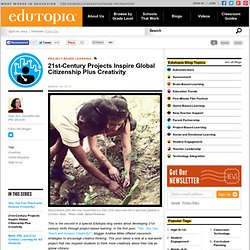
Photo credit: Naima Penniman This is the second in a special Edutopia blog series about developing 21st century skills through project-based learning. In the first post, "Yes, You Can Teach and Assess Creativity! ", blogger Andrew Miller offered classroom strategies to encourage creative thinking. This post takes a look at a real-world project that has inspired students to think more creatively about their role as global citizens. When Tech Valley High School opened its doors in 2007 in Rensselaer, New York, it offered students from across the state's Capital Region a chance to experience a different kind of public education.
Those components recently came together in a project that took Tech Valley students to a rural village in Haiti, where they learned firsthand what it means to be creative -- and caring -- 21st century citizens. The Backstory. » Digital Citizenship Is More Than Living By a Set of Rules. I’ve avoided responding to an email from a school district leader asking for resources on digital citizenship that he can give a principal to work on developing.
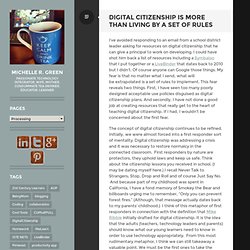
I could have shot him back a list of resources including a Symbaloo that I put together or a LiveBinder that dates back to 2010 but I didn’t. Of course anyone can Google those things. My fear is that no matter what I send, what will be extrapolated is a set of rules to implement. This fear reveals two things. First, I have seen too many poorly designed acceptable use policies disguised as digital citizenship plans. Online Citizenship. Most people are good citizens in the offline world.
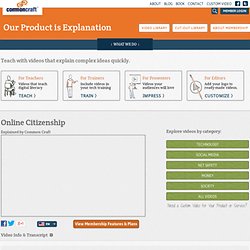
They are kind to others, they obey laws and want their community to be a better place. But these days many of us are also citizens of the online world. We participate in discussions, share photos, and get help using websites. While this makes communication faster and easier, it can also cause problems. Stewart is a good guy. But when Stewart goes online, he seems to become a different person. He often writes provocative comments on blogs and video websites without contributing anything valuable. Recently a friend recognized his online name on a few comments and gave him a call. Stewart was speechless - he never meant to hurt anybody. But that all changed. Now he sees that citizenship means giving people the same respect he does in the real world, even when he disagrees with them.